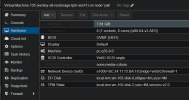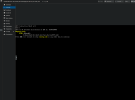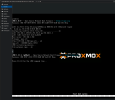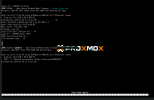Hi,
I am running PVE 8.3, trying in a OVMF UEFI Q35 VM
Does not show the iPXE banner when booting it looks like an unnamed PXE boot rom ?
Maybe something default provided with UEFI ?

In my proxydhcp running dnsmasq I hand out ipxe.efi to client whose userclass is not iPXE
root@ipxe:~# cat /etc/dnsmasq.d/pxe.conf
Code:
# Enable Proxy DHCP
dhcp-range=192.168.1.0,proxy,255.255.255.0
# Tag for iPXE clients based on the "iPXE" User-Class
dhcp-userclass=set:ipxe,iPXE
# PXE service for x86PC
# Serve "ipxe.pxe" to regular PXE clients
pxe-service=tag:!ipxe,x86PC,'Load iPXE firmware for PXE clients',ipxe.pxe
# Serve "autoexec.ipxe" to iPXE clients (based on the iPXE tag)
pxe-service=tag:ipxe,x86PC,'Load iPXE script via TFTP',autoexec.ipxe
# UEFI configurations for x86-64 EFI
# (Unchanged in this example)
pxe-service=X86-64_EFI,'Start iPXE (EFI)',ipxe.efi
# PXE prompt message (optional, uncomment if desired)
# pxe-prompt="PXE Boot Menu",10
I have created an iPXE EFI 64 rom using the following build url on my rom-o-matic lxc thing
http://rom-o-matic.lan/?BINARY=8086...KEYBOARD:=1&branding.h/PRODUCT_NAME=alldress&
I attached the rom file this created 80861539.efirom
It is strange ipxe.org seems to expect user to build their own rom, you would think the most common roms would be pre-compiled, but I can't find 'em.
Make updating quite a chore !
So anyway, I look in /usr/share/kvm and there are quite a few rom files in there.
Code:
efi-e1000e.rom efi-pcnet.rom pxe-e1000.rom pxe-rtl8139.rom
efi-e1000.rom efi-rtl8139.rom pxe-eepro100.rom pxe-virtio.rom
efi-eepro100.rom efi-virtio.rom pxe-ne2k_pci.rom qboot.rom
efi-ne2k_pci.rom efi-vmxnet3.rom pxe-pcnet.rom
Looks like mine is the efi-e1000.rom ?
When I compiled this I had to specify the VENDOR and DEVICE ID
Strangely that is not specified on the build url, I set 8086 and 1539
I renamed efi-e1000.rom to efi-e1000.rom.bak
Then I copied over 80861539.efirom to /usr/share/kvm/efi-e1000.rom
But that just broke it apparently

Will work on that more tomorrow !





